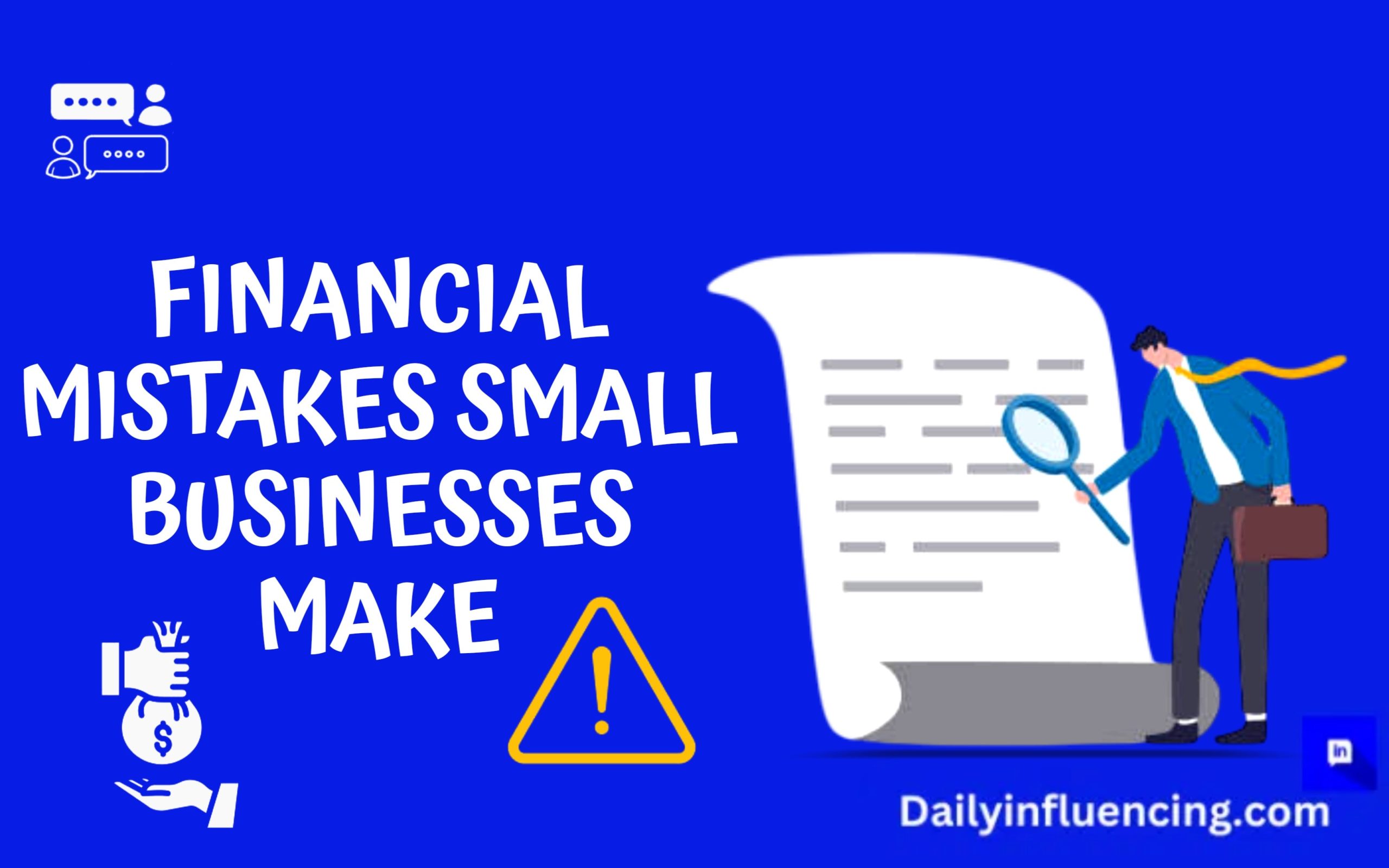
Even the most brilliant business ideas can fall short without solid financial management. Your finances are the backbone of your business, and mastering how to manage them effectively can be the key to unlocking growth and long-term success.
Whether it’s financial planning, cash flow, or budgeting, every financial decision you make shapes the health of your business. In this post, we’ll uncover the most common financial mistakes that entrepreneurs often make and provide you with actionable tips to steer clear of them. By the end, you’ll recognize these pitfalls and know exactly how to avoid them, setting your business on a path to financial stability and growth.
Financial mistakes small businesses make and how to avoid them
1. Inadequate financial planning
Not having a clear financial plan is like driving a car with a blindfold on. You might get by okay for a while, but in the long run, it can cost you your business.
Inadequate planning can lead to poor decision-making, overspending or the inability to put enough money aside.
A financial plan helps you outline your current financial situation, your short-term and long-term goals and strategies to achieve those goals. These strategies can include budgeting, cash flow, savings, etc.
How to avoid this mistake
Create a simple financial document detailing short-term and long-term goals, budget, funding sources and revenue projections. A clear plan makes it easier to make informed business decisions.
2. Mixing personal and business finances
This is a significant financial mistake that small business owners make. When your personal and business accounts are mixed, it makes it close to impossible to assess how well your business is doing.
Imagine using one account to pay suppliers and also go shopping. This can lead to confusion and make accounting very challenging. In the long run, this can lead to business failure,
How to avoid this mistake
The first step you should take as a business owner is to open a separate business account. Keep your expenses separate from your business expenses. Make sure you don’t use your business account for personal purposes.
3. Not reinvesting profits
This is a very important rule of getting rich: reinvest a part of your profit into your business. A common financial mistake small business owners make is the desire to spend the extra cash on personal use. However, failing to reinvest in your business can keep your business stagnant. Additionally, a business may struggle to stay competitive if it is not growing.
How to avoid this mistake
Look at your financial plan and identify areas that will provide the highest return on investment (ROI). Whether it’s expanding your product line, improving your marketing strategies or even upgrading your business equipment, reinvesting in your business positions you for long-term success.
4. Lack of an emergency fund
This is a critical mistake many small business owners make. Unexpected expenses can affect your budget and lead to cash flow problems. This can result in unnecessary debt and affect the smooth operations of your business.
How to avoid this mistake
Every business needs to have a financial safety net. Set aside a percentage of your business profit. This money should be able to cover at least three to six months of operating expenses without affecting business flow. Automate this transfer into a separate account to build a consistent routine.
5. Relying on one stream of income
Focusing on a single product or service works for small business owners, especially those still starting. However, relying on one income stream can make your finances vulnerable to market changes or economic downturns.
How to avoid this mistake
Look for opportunities to generate income in multiple ways. Expand your business offerings and charter into new markets to meet different customer needs.
6. Lack of a business budget
This is one of the biggest and most common financial mistake small businesses make. Without a clear budget, its easy to overspend, allocate funds to the wrong resources and find it difficult to make informed financial decisions.
How to avoid this mistake
Create a business budget that helps you track all your income and expenses. Use your financial plan to determine areas to allocate more resources for growth. Make your budget detailed and flexible enough for unexpected expenses.
7. Not comparing your budget with actual expenses.
A budget is a tool designed to guide your financial decisions, but it’s not fail-proof. Without regularly checking how your actual spending aligns with your budget, you can easily overlook potential problems. This mistake is common to many business owners.
How to avoid this mistake
Create a schedule to regularly review your budget. This can be weekly or monthly. Make adjustments when you notice any problems before they affect your business operations.
8. Undercharging your product/service
Many small business owners make this mistake when they’re still starting. While it might seem like a good strategy to offer lower prices of your goods or services to attract many customers, its not.
Charging too little can lead to burnout, zero profit and can even signal to your customers that your products might not be valuable.
How to avoid this mistake
Before setting prices, study your competitors to understand how they price. Also, calculate your business expenses before setting a price. If your product or service offers unique value, better quality or even exceptional customer service, make sure your pricing reflects that.
9. Taking on too much debt
Taking on debt can be a useful way to finance your business. A line of credit makes it possible to look into growth opportunities or even investments. However, taking on too much debt is a mistake every business owner should avoid. Too much of everything is bad, and this statement is accurate when it comes to taking on debt.
How to avoid this mistake
Only take a debt when it is necessary and create a budgeting plan for it. Be mindful of interest rates, repayment terms and more importantly, ensure that the money is used for your business growth and expansion.
10. Poor cash flow management- Financial mistakes small business owners make
This single mistake can damage your business. Cash flow, as you already know, is the lifeblood of any business. This is what allows you to pay bills, pay employees and invest in growth. A business can be making a profit but still have a poor cash flow. When this isn’t properly managed, it can affect every area of your business.
Read up on how to manage your business’s cash flow.
How to avoid this mistake
Ensure prompt invoicing. Customers should know due dates for sending in payments and penalties that ensue when that is not respected.
You can create installment plans for customers who can’t pay off at once. Additionally, keep a cash reserve that can serve your business during lean or slow periods.
Lastly, create a cash flow forecast to help you anticipate slow periods and unexpected expenses.
11. Improper record keeping
Without accurate and organized records, it becomes difficult for you to track expenses and even ensure your financial data is accurate. Many small businesses find it tiring to create systems for proper record keeping.
How to avoid this mistake
Create a system for categorizing your important financial documents. This can be as simple as using labelled folders or even as advanced as investing in accounting software like QuickBooks or Xero to automate your record keeping.
12. Mismanagement of inventory
Poor inventory management means either having too much inventory (leading to excess costs) or too little inventory (leading to lost sales). When inventory is poorly managed, it can lead to wasted resources, cash flow problems and missed sales opportunities. Finding a balance on when and what to stock up on can help maintain healthy finances.
How to avoid this mistake
Regularly monitor your inventory to ensure you have the right amount of stock at all times. Take stock records either weekly or bi-weekly to know products you’re running out of.
Additionally, always analyze sales trends and find the product that consumers love purchasing.
13. Inadequate tax planning- Financial mistakes small business owners make
Inadequate tax planning is one of the biggest financial mistakes that small business owners make. When you don’t plan for tax payments, you might end up paying more than necessary or even facing legal issues. A proper tax plan ensures you’re compliant with tax laws.
How to avoid this mistake
Understand what taxes your business is required to pay. If you’re not sure how to go about it, you can hire an expert in the field to help you out.
14. Lack of financial knowledge
When you don’t understand basic financial concepts, it’s easy to make poor decisions that can lead to cash flow problems, inadequate savings and even business failure. Being a business owner requires both skill and knowledge.
How to avoid this mistake
Educate yourself. Read books, take affordable online courses, and reach out to experts. Attend networking events. Staying knowledgeable in the world of business is non-negotiable.
15. Not seeking professional help.
As a small business owner, there’s a desire to handle everything by yourself so as to save up money. While this can work out in the beginning, not seeking for professional help, especially in areas where you don’t understand, can lead to different financial challenges.
How to avoid this mistake
Hire a consultant or a financial advisor to help you with long-term financial planning. A consultant can show you how to scale sustainably and help you identify areas where you can allocate more resources or reduce costs.
Conclusion- Financial Mistakes Small Business Owners Make
The financial decisions you make can make or mar your business growth. By understanding these financial mistakes small business owners make and how to avoid them, you can prevent many of these pitfalls and build a financially stable business.





